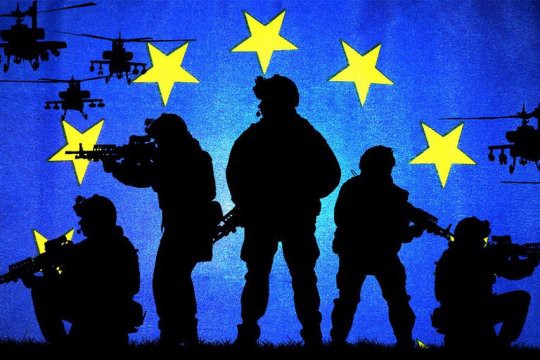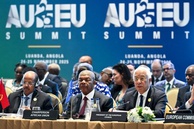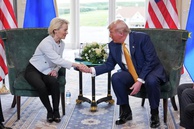During the August 18 meeting in the White House between US President Donald Trump and European leaders representing the so-called "coalition of the willing," French President Emmanuel Macron, commenting on security guarantees for Ukraine and Europe, once again urged Europeans to continue arming themselves, repeating the hackneyed line of "security guarantees for Europe and Ukraine in view of the threat from Russia." It looks like this is not the main thing, though. Donald Trump's statements about the United States no longer being the main donor of the alliance and about the possible withdrawal of part of its troops from Europe fired up the European leaders’ "defensive instincts."
The leader of the French party "Patriots" Florian Philippot immediately responded to Macron’s statement, accusing him of trying to "deliberately demonize Russia and use the fear of war in his own interests." On his page on the social network X, Philippot noted that "the French leader exaggerates the war, that is why he is dangerous, and as for Russia's aggressiveness, it is a myth inflated by Macron for his personal agenda." He also stated that Macron, like the leaders of European countries that are part of the "coalition of the willing," seeks to escalate the conflict with Russia, using Ukraine for this purpose with an eye to transforming the European Union into a single state and creating a so-called "European army."
It is worth recalling here that Emmanuel Macron has previously said more than once that he is ready to try on the uniform of the commander-in-chief of the European army. Back in 2018, when speaking in Verdun on the eve of the 100th anniversary of the end of World War I, Macron proposed creating a European army that would be able to defend Europe against Russia on its own. Then, apparently recalling Charles de Gaulle's independent policy, he stated that "Europe must be sovereign, and its defense must be autonomous,” noting in passing that "the United States is our historical ally and continues to be so, but being an ally does not mean being a vassal, so we should not depend on them."
For fairness’ sake, I should admit that discussions about a pan-European army, corps, battle groups and other military formations have been going on in Europe for over 30 years now. France and Germany have traditionally supported this idea, but many in Europe are opposed to it. Britain has been actively against the creation of a pan-European army, promising with Anglo-Saxon directness to block any attempts to create a military structure duplicating NATO. Former NATO Secretary General Jens Stoltenberg also opposed this idea, arguing that since Europe is largely dependent on NATO (as it now turns out, on the US) in terms of security, it will not be able to cope with new threats alone. As for the European armed forces, Stoltenberg believes that “there is no need to create a competitor in Europe to the North Atlantic Alliance, which is extremely important for the EU.” Well, what else could one expect from NATO’s Secretary General?
Poland called the idea of European armed forces a risky and unrealistic one. “This is an unrealistic dream, even if we theoretically assume that such a European army will appear, then who will control it?” the head of the Polish National Security Bureau, Stanislav Kozei wondered. Notably, almost all US presidents have opposed the idea of a pan-European army, fearing that the creation of independent armed forces in Europe could undermine the role of the North Atlantic Alliance.
Now, as Slate online magazine writes, Donald Trump should applaud Macron because with the emergence of an independent European army Washington will no longer have to spend billions to ensure the security of the Old World. However, Trump did not support his French colleague’s adventurous stance and harshly criticized this idea of the Europeans, led by Macron, calling him a “short-sighted politician.” Trump has two reasons to be dissatisfied. On the one hand, being an anti-globalist, he is generally hostile to anything that would be conducive to any type of European integration, and the creation of European armed forces is precisely aimed at deepening the military integration of Europe. In fact, he falls just short of viewing the EU as an enemy, believing that it was created to harm America. On the other hand, Trump would hate to see the Old World breaking free from US influence. Hence, the loud chorus in Washington now warning that Europe is incapable of ensuring its own security without NATO.
As for Moscow's position, President Vladimir Putin has repeatedly addressed this topic calling the ongoing efforts to create a pan-European army "a positive process from the standpoint of strengthening the multi-polarity of the world." He also believes that "this idea has been discussed for a long time," recalling that "former French president Jacques Chirac once told me about this." 1
Meanwhile, experts have expressed a great deal of pessimism about the idea, reasonably warning its "European initiators" about the multiple technical issues standing in the way of creating a pan-European army, above all the uniform military-technical standards and financing. Considering that having agreed to Washington’s request, NATO’s European members will have to contribute up to 2.5 percent of their GDP to the alliance’s defense budget starting this year, the creation of a European army is hardly feasible any time soon. EU countries will simply not be able to cope with this financial burden on "two fronts."
Realizing this, the European leaders have obviously decided to change the format and go for a simplified scheme of militarization of the European Union, while formally staying within the NATO framework. When delivering a keynote speech to the European Parliament in September last year, European Commission President Ursula von der Leyen, who had initiated this whole plan, promised to make "Europe stronger and turn the EU into a real defense union." She proposed to protect European democracy with the help of "investments in security and defense." The post of a European Commissioner for Defense was thus created for the first time in the history of the economic union, and filled by Lithuania’s ex-Prime Minister Andrius Kubilius, known for his anti-Russian position. According to von der Leyen's plan, EU member states will remain responsible for their own armies and military doctrines, but the EU leadership should play a coordinating role, primarily when it comes to strengthening the military-industrial base and innovation in this area, and should also work on creating a single market for weapons and military equipment. This is really bad news for Trump, since the US sells its weapons through NATO and with a 10 percent markup too. By the way, it was Washington that never tired of urging Europeans to take on the defense of their continent, wasn’t it?
Then the issue of money came up. On March 4 of this year, Ursula von der Leyen announced that she had proposed to the leaders of the EU countries a ReArm Europe Plan that could see member states mobilize up to €800 billion for the rearmament of the European Union. The EU countries are to borrow up to €150 billion for defense. The EU plans to borrow this money on the capital markets and then give it back in the form of loans to member states, provided that they jointly purchase weapons in Europe. These funds will go towards the production of air defense systems in the EU and weapons for Ukraine. Von der Leyen also proposed that countries ramp up their defense spending by 1.5 percent in order to raise another €650 billion for weapons production. She believes this money should come in the form of state loans by the EU countries themselves. In addition, the European Commission allowed the use of funds from the EU's Cohesion Policy program for stimulating the military industry. 2
In Moscow, her speech was seen as a sign of giving a “military coloring” to the European Union and proof of the European countries’ focus on "militarization, escalation of tension and confrontation." According to the Kremlin spokesman Dmitry Peskov, "Europe has opted for militarization and has turned into a party of war." Peskov said this while commenting on Brussels’ actions taken against the backdrop of Russian-US negotiations aimed at resolving the conflict in Ukraine. He believes that "this attitude of Europe is at odds with the attitude of the presidents of Russia and the United States to find ways to enter a peaceful settlement process." 3
The EU leaders went even further, though, and now see the process of defense and security of Europe not just as saturation of European EU member states with modern weapons and military equipment, but also as a process of turning Ukraine into a special buffer zone between Russia and the European Union. According to Ms. von der Leyen, "the best investment in European security is an investment in the security of Ukraine. We must turn Ukraine into a steel porcupine that potential invaders will not be able to digest." Belligerently frank!
Her position was readily echoed by British Prime Minister Keir Starmer who, during the August 18 meeting with Donald Trump in the White House, said: "When we talk about the security system, we talk, first of all, about the security of Ukraine, meaning the security of Europe, as well as the United Kingdom."
The head of the Kyiv regime Zelensky responded to this by proposing a new security architecture in Europe where NATO and Europe could provide Kyiv with security guarantees similar to Article 5 of the Alliance Charter.
Against the backdrop of peace negotiations, plans to ensure Ukraine's security after the end of hostilities are coming to the fore. According to Bloomberg, as part of security guarantees, the allies plan to strengthen the Ukrainian army without limiting its numbers, and a package of security guarantees for Ukraine will be developed by the "coalition of the willing" in the near future. At the same time, according to The Wall Street Journal, the United States will play only a "coordinating" role in this process, with Secretary of State Marco Rubio heading a task force to develop security guarantees for Ukraine.
How could the package of security guarantees for Ukraine look like? In an interview with Fox News, Donald Trump outlined his interpretation of possible security guarantees for Kyiv. He said that France, Britain, Germany and several other European countries want to deploy their troops in Ukraine. The United States, Trump said, can help Europe with troop deployment, including air support.
Russia’s Foreign Minister Sergey Lavrov described the plans of some EU countries to send so-called peacekeepers to Ukraine as a provocative step aimed at reinforcing unhealthy illusions among the authorities in Kyiv and Brussels. He added that discussing this issue without Russia's participation would lead to nowhere.
Meanwhile, US ambassador to NATO Matthew Whitaker just stated in an interview with Fox News that the United States intends to make Ukraine a major supplier of military equipment to Europe. 4 Just what this means remains to be seen.
According to Reuters, as part of the security guarantees, the Kyiv authorities have offered foreign arms manufacturers to test their latest products right in the combat zone. As part of what is dubbed as “Trials in Ukraine,” foreign companies will send their products there, conduct online training on their use, and then wait for reports from the Ukrainian military on the results of testing the weapons.
All this means that the “coalition of the willing” views the territory of Ukraine as an integral and key part of their plan to militarize the European continent by creating a militarized buffer zone between Moscow and Brussels. On top of that, Bloomberg has just reported that European leaders are discussing the Italian version of “NATO-lite” for Ukraine, that would commit Kyiv’s allies to decide within 24 hours whether to provide military support to the country if comes under attack. While the “NATO-lite” option would fall well short of the military alliance’s collective defense pledge enshrined in Article 5 of the NATO Charter, obviously meaning Russia again.
Who can say for sure that EU wants peace?
----------------------------------------------------------
European army. Why does Macron believe it is necessary, while Trump is against? 15.11.2028. https://tass.ru/mezhdunarodnaya-panorama/5795341
AFP: EU summit agrees on EC-proposed plan for militarization of Europe. 06.03.2025. https://tass.ru/mezhdunarodnaya-panorama/23330455
Europe has tuned into a party of war, Peskov said. 20.03.2025. https://ria.ru/20250320/peskov-2006167381.html
Whitaker: Ukraine will become a major supplier of military equipment to Europe. 19.08.2025. https://tass.ru/mezhdunarodnaya-panorama/24806505
read more in our Telegram-channel https://t.me/The_International_Affairs

 11:15 22.08.2025 •
11:15 22.08.2025 •



























